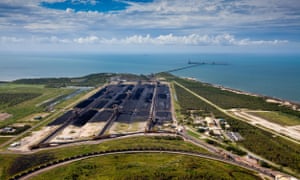Company says revamped plans would still allow Carmichael coalmine to go ahead but delay ‘significant capital expense’
Adani has applied to increase the export capacity at its Abbot Point
coal terminal, allowing it to expand the port relatively quickly without
the “significant capital expense” of its long-term expansion plans.
Plans lodged with the Queensland state development department on Tuesday show Adani wants to build a conveyor and transfer tower at Abbot Point “terminal one” to expand throughput by 10m tonnes a year.
The company says the revamped plans – under which it would still be able to go ahead with its controversial $16bn Carmichael coalmine in the Galilee Basin – would delay the “significant capital expense” of building a second loader.
Plans for a second terminal, which would require dredging and other works to increase capacity to 90m tonnes a year, would be downsized and deferred but not scrapped.
But despite putting the dredging on hold, the plans could provide a flashpoint in an ongoing dispute about cultural heritage and the protection of sacred Indigenous sites.
Guardian Australia understands the Queensland Aboriginal and Torres Strait Islander partnerships department has sought to mediate a disagreement between Adani and two groups representing Juru traditional owners.
One group, Juru Enterprises Limited, has applied for a stop order that could force Adani to cease works in the vicinity of Abbot Point. It claims previous cultural heritage surveys are invalid and need to be reviewed.
Adani’s expansion plans are likely to now provide a specific focus for the traditional owners pursuing the stop order application.
The existing terminal has capacity for about 50m tonnes of coal a year, but is exporting only about half that. The planned works would allow 60m tonnes to potentially be exported without building a terminal.
Its application said the plan would “allow the immediate ... capacity increment demand at the port to be realised in the most efficient manner”.
“This enables significant capital expense, terrestrial disturbance and the requirement for offshore works to be deferred,” it said.
Tim Buckley, an energy market analyst at the Institute for Energy Economics and Financial Analysis, said the expansion appeared to be “more sensible business planning than flagging anything more material”.
“Getting a 20% expansion of terminal one would probably add another $100m in value,” he said. “But it’s only sensible business strategy if you think you can use the capacity.
“If they don’t go ahead with Carmichael then Abbot Point is under-utilised and there’s no capacity to fix that.”
Adani said in a statement this month that it continued to finalise financing of the Carmichael project, which includes the port expansion, the construction of a rail link, and construction of the mine.
The company still requires some regulatory approvals, and faces ongoing court and other challenges by environmentalists and Indigenous traditional owners.
Plans lodged with the Queensland state development department on Tuesday show Adani wants to build a conveyor and transfer tower at Abbot Point “terminal one” to expand throughput by 10m tonnes a year.
The company says the revamped plans – under which it would still be able to go ahead with its controversial $16bn Carmichael coalmine in the Galilee Basin – would delay the “significant capital expense” of building a second loader.
Plans for a second terminal, which would require dredging and other works to increase capacity to 90m tonnes a year, would be downsized and deferred but not scrapped.
But despite putting the dredging on hold, the plans could provide a flashpoint in an ongoing dispute about cultural heritage and the protection of sacred Indigenous sites.
Guardian Australia understands the Queensland Aboriginal and Torres Strait Islander partnerships department has sought to mediate a disagreement between Adani and two groups representing Juru traditional owners.
One group, Juru Enterprises Limited, has applied for a stop order that could force Adani to cease works in the vicinity of Abbot Point. It claims previous cultural heritage surveys are invalid and need to be reviewed.
Adani’s expansion plans are likely to now provide a specific focus for the traditional owners pursuing the stop order application.
The existing terminal has capacity for about 50m tonnes of coal a year, but is exporting only about half that. The planned works would allow 60m tonnes to potentially be exported without building a terminal.
Its application said the plan would “allow the immediate ... capacity increment demand at the port to be realised in the most efficient manner”.
“This enables significant capital expense, terrestrial disturbance and the requirement for offshore works to be deferred,” it said.
Tim Buckley, an energy market analyst at the Institute for Energy Economics and Financial Analysis, said the expansion appeared to be “more sensible business planning than flagging anything more material”.
“Getting a 20% expansion of terminal one would probably add another $100m in value,” he said. “But it’s only sensible business strategy if you think you can use the capacity.
“If they don’t go ahead with Carmichael then Abbot Point is under-utilised and there’s no capacity to fix that.”
Adani said in a statement this month that it continued to finalise financing of the Carmichael project, which includes the port expansion, the construction of a rail link, and construction of the mine.
The company still requires some regulatory approvals, and faces ongoing court and other challenges by environmentalists and Indigenous traditional owners.

No comments:
Post a Comment